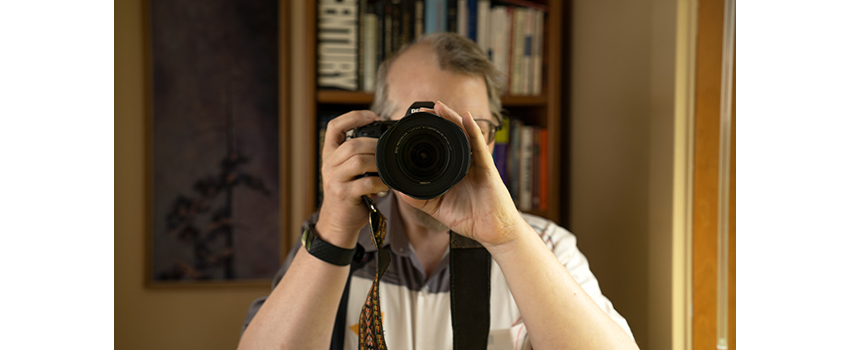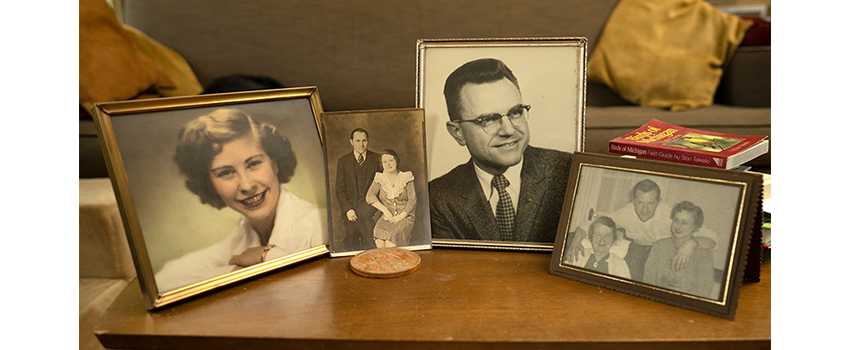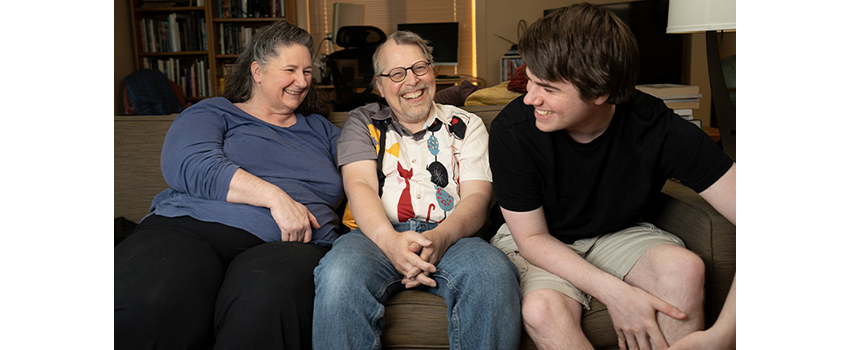Living with Stage 4 Prostate Cancer
contributed by Mary Clare Fischer
The four years since Scott Ward was diagnosed with advanced prostate cancer have been a roller coaster. But, amid side effects and surgeries, he’s found solace in creating art and memorializing his family’s stories.

Photo credit: Erica Bass
I am defiant
Though my life will be shorter
Memory will last
— Scott Ward
By the time the doctors found the cancer, it had spread.
Lymph nodes, ribs, lungs, pelvis — all were playing host to cells that had migrated from the tumor in Scott Ward’s prostate to become stage 4 cancer.
Scott was devastated. One of his grandfathers and two of his uncles had died from prostate cancer at relatively young ages, so he assumed his diagnosis was as good as a death sentence.
And, at 54, he wasn’t ready to die yet. He wanted to spend more time with his wife and teenage son. To eventually retire and do more of the things he actually wanted to do instead of work. To maybe even build a close relationship with a grandchild like his grandparents had done with him.
Plus, as his family’s historian, he worried about what would happen if no one was around to remember the Ward lore.
“All this negative stuff was in my mind,” Scott said. “I was visiting a dark place and mucking around there for a while. But what I came to realize was: It does nobody good to stay down there.”
Instead, with help from a Rogel therapy group for people with advanced cancer, Scott has figured out the legacy he wants to leave behind. Amid the swings of worrisome news and the jubilation of discovering new treatment options, he’s documented his experiences and memories in photos, haikus, short stories and even tattoos, while holding onto hope that perhaps he’ll have more time left than expected.
“If there wasn’t anything I could do about cancer necessarily, I wanted to live as fruitful and joyous a life as I could,” he said. “And mentally, that’s where I’ve tried to stay as much as possible. I didn’t think I was going to be here, and I am.”
What possible plan
Can there be when faced with
Terminal illness?
The first course of treatment was a shot in the butt.
Testosterone is the primary way that prostate cancer grows and spreads, so Rogel Cancer Center urologic oncologist Zachery Reichert, M.D., Ph.D., first gave Ward an injection to lower the amount of the hormone made by Scott’s testicles.
Reichert warned Scott about some of the side effects of this androgen deprivation therapy. (Scott’s wife, Kathleen Folger, remembers laughing in the doctor’s office at the mention of hot flashes.) But the symptoms were worse than Scott had expected. He lost most of his hair, including a bushy beard, and his testicles “shrank to the size of acorns.” The hot flashes came every 30 minutes.
“Welcome to my world,” Kathleen had said.
Reaching into the
Unknown, one seeks to be heard
Open, one learns grace
Yet, as Scott lost some elements of his identity, he added others he’d felt he couldn’t explore before his diagnosis. He got one ear pierced and then the other. Next came the forearm tattoos: the Latin phrase “Ex adversis, viribus,” which translates to, “From adversity, strength,” and an arrow that doubles back on itself.

Photo credit: Erica Bass
Finally, he designed a larger tattoo for his chest. The artwork is made up of several symbols that represent concepts ranging from durability, a word Reichert used to describe what he was hoping to see from the series of cancer treatments Scott would undergo, to balance, which is all Scott says that he can reasonably hope for.
Kathleen was surprised but understood that these positive affirmations helped him find the motivation to keep going.
“After the second or third one, I said, ‘I've never dated a bad boy,’” she recalls with a grin, “but somehow I find myself married to one.”
Living one’s passion
Is an act of defiance
Go not quietly
It was the first day of spring. The sun was out and the temperature had climbed enough for Scott to sit outside in his front yard on the west side of Ann Arbor.
He’d started taking two oral medications to treat his cancer and had just completed his second cycle of chemotherapy. Research had shown that adding additional treatments to the androgen deprivation therapy can help people with prostate cancer live significantly longer, and Reichert thought Scott might tolerate them well, given his relatively young age. (The average age of diagnosis for prostate cancer is 66.)
Under the fledgling sun, a haiku popped into his head fully formed. He wrote it down and set it aside, but the words wouldn’t stop coming. Throughout the summer, he kept a pad of paper and a pencil next to his bed to jot down the steady stream of poetry that flowed from his mind.
“It was like a muse was whispering to me on a daily basis,” Scott said.
Then I remember
There is much to live for now
Legacy calls me
Squares of bobbing heads filled the computer screen as people with advanced cancer logged onto Zoom. It was June 2020, and a new cohort of the meaning-centered support group at the Rogel Cancer Center was coming together for the first time.
The main topic of discussion was legacy, a mental road that Scott had traveled a bit already. He voiced his fears about how he could remain a presence in his son’s life and whether it was possible to preserve the family stories that his son might appreciate more when he’s older. Could there be a way for him to translate the past for his family, he wondered, even when he wasn’t here anymore?
Others in the group had similar thoughts.
“Telling your story to your survivors was the biggest theme we all talked about,” Scott said. “Everybody had their own way of doing so, but they all felt they would be able to leave an imprint of their own for family and friends.”
For Ward, that meant delving back into photography and exploring writing, another hobby he’d always wanted to pursue but felt constrained from trying. Getting cancer, though, had freed him up to experiment.
The well is too deep
Despair, I think to myself
How can I get out?
Just as suddenly as Scott’s creative inspiration started, it stopped. The timing may not have been coincidence. The chemo wasn’t working. In fact, the cancer had spread to Scott’s liver, an ominous sign.
“What’s left?” Scott asked Reichert.
Reichert very kindly “did not pull any punches,” as Scott said.
“Essentially, we are looking at a very short time horizon unless a second chemotherapy works,” Reichert responded.
After their virtual appointment ended, Scott got off the phone and emerged from the basement. He couldn’t stop crying.
Spend time in the dark
Opine for your lost life, then
Claw your way to light.
Scott went into what he calls engineer mode. He wrote down all the logistical tasks he needed to complete before he died — write his obituary, buy a cemetery plot — and threw all his energy toward his to-do list.

Photo credit: Erica Bass
Meanwhile, he started on a combination of two new chemotherapies. Reichert knew of research that had found this specific pairing was more effective than just one of the two drugs by itself.
And for Scott, that proved to be the case. After 10 cycles of the dual-agent chemo, Reichert could find no evidence of active cancer on Ward’s scans.
“That was the game changer,” Scott said.
“His quality of life was so good that we decided to stop chemotherapy,” Reichert says. “The goal is to use chemotherapy to live, not to live to get chemotherapy.”
Raise hands in triumph.
Revel in spring renewal.
Life and hope are one.
With the good news in hand, Scott felt a renewed sense of purpose. He started entering online photography competitions and doing well. His work was featured in the cancer center’s Voices Art Gallery, which showcases art from patients living with cancer.
For Christmas, Scott’s nephew bought him a subscription to Storyworth, a startup that provides questions designed to capture family history and then compiles the answers in a keepsake book.
Scott turned out one Storyworth response a week for seven weeks, writing detailed, 10-page entries. One of his pieces is titled “Adventures in Dynamite” and chronicles several family stories that feature TNT.
“My grandfather, trying to shift a large boulder in the basement of the family farmhouse, thought it would be a good idea to use dynamite to do so — with my grandmother still in the house,” Scott shared. “It lifted the house right off the foundation, skewing it slightly off true. She was fine and had no idea what he had tried to do.”
Dark thoughts fill my days
I will not have a full life
Things left unfinished
In May 2022, Scott’s world exploded again. He began falling down, unable to stand on his left leg without toppling over. There were cognitive issues, too; he once got lost on the way home from work for two hours.
The culprit was a racquetball-size tumor in Scott’s brain. His doctors thought that because chemotherapy doesn’t get into the brain very well, the treatment might have worked elsewhere in his body but never made it to his brain — especially because they could tell the tumor had metastasized from the original cancer in Scott’s prostate. He would need surgery.
“Cancer wasn’t a walk in the park,” Scott said. “But come on, a brain tumor? You’ve got to be kidding me.”
Live now, in the now
Tomorrow will bring new joys
New chances for growth
The operation went well as did the radiation that Scott received three weeks later.
It took him a few months to get back to doing normal activities, but the symptoms produced by the tumor have now resolved.
“It’s unbelievable how well he’s doing,” Kathleen said. “Brain surgery seems like the most frightening and terrible thing, but he’s doing great.”

Photo credit: Erica Bass
Another unexpected bright side: The Michigan Oncology Sequencing Center (MI-ONCOSEQ) at Rogel was able to genetically sequence Scott’s tumor once it was removed.
The researchers learned that Scott’s tumor didn’t have germline mutations — ones that had been passed down from his ancestors. Instead, it had mutations that occurred at random. This explained why Ward had responded so well to certain types of chemotherapy and suggested options for more targeted treatments that might do an even better job of getting rid of Ward’s cancer.
The positive outlook lifted Scott into a creative upswing. His photos have been displayed at the Michigan Fine Arts Competition, and he’s writing again, mostly fictionalized versions of his family stories.
His words are rich with imagery, transporting readers back to the days of yesteryear through his own unique lens.
Take the beginning of one story, which he stresses is still an unfinished draft, that’s set on his family’s 200-year-old farm.
“The spring on the old screen door registered its outrage at being disturbed after such a long time, making that ting-ting-ting sound at an ever-increasing pitch as it stretched past its physical limit…Suddenly, its distress ignored for too long, the spring snapped noisily and finally, both ends rebounding back to door and frame…
“The door itself was fine,” he continued, “maybe now with a few additional marks to add to those of the last century.”
Resources
To see if the meaning-centered support group for patients with advanced cancer could help you on your cancer journey, call 877-907-0859. All complementary therapies are free for Rogel Cancer Center patients.
For more on how the Michigan Oncology Sequencing Center is transforming treatment for patients with metastatic cancer, please read Your Genes and Future Cancer Treatment.
Continue reading the Fall, 2022 issue of Thrive
